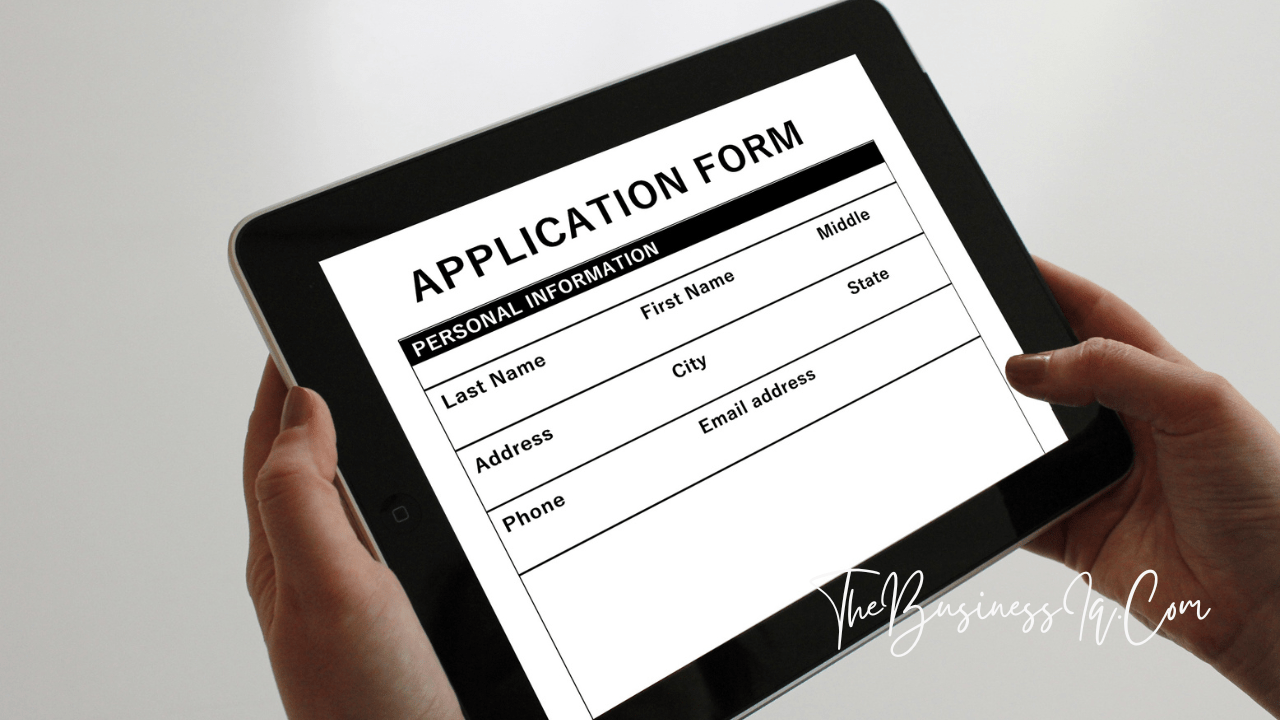Getting a business loan can be a crucial step in starting or growing your business. However, the loan application process can be complex and intimidating.
In this article, we’ll guide you through the process of getting a small business loan, from preparing your loan application to choosing the right lender and loan type.
Small Business Loan – A Step-by-Step Guide to Securing a Business Loan

Determine Your Business Loan Needs
Before you start applying for a business loan, you need to determine how much money you need and how you plan to use it.
This will help you narrow down the type of loan that’s best for your business.
Consider factors like the size and stage of your business, your credit score, and your revenue projections.
Exactly! It’s important to have a clear understanding of your business loan needs before you start the application process.
This will help you avoid overborrowing or underborrowing, and ensure that you have enough funds to achieve your business goals.
To determine your business loan needs, start by assessing your current financial situation.
Consider factors like your monthly expenses, revenue projections, and cash flow. Identify any areas where you may need additional funding, such as inventory, equipment, or marketing.
Next, determine how much money you need to achieve your goals.
Be specific and realistic in your estimates.
Don’t forget to account for any fees or interest that may be associated with the loan.
Finally, consider how you plan to use the funds. This will help you narrow down the type of loan that’s best for your business.
For example, if you need funds to purchase new equipment, you may want to consider equipment financing.
If you need funds to cover short-term expenses, you may want to consider a line of credit.
By taking the time to determine your business loan needs, you’ll be better prepared to choose the right loan type and lender and increase your chances of getting approved for the loan.
Prepare Your Loan Application
Once you’ve determined your loan needs, it’s time to prepare your loan application.
This typically includes a business plan, financial statements, and other documents that demonstrate your ability to repay the loan.
Be prepared to provide detailed information about your business, including your legal structure, ownership structure, and financial history.
Yes, preparing a strong loan application is crucial to getting approved for a business loan.
Lenders want to see that you’re a responsible borrower who is capable of repaying the loan on time and in full. To prepare your loan application, follow these steps:
Gather your financial documents
This includes your balance sheet, income statement, cash flow statement, and tax returns.
These documents will help lenders evaluate your financial health and your ability to repay the loan.
Develop a business plan
A business plan outlines your business goals, target market, competition, and marketing strategy.
It also includes financial projections and a breakdown of how you plan to use the loan funds.
Prepare a loan proposal
A loan proposal summarizes your loan needs, your business’s financial history, and your plans for the loan funds.
It should include a clear repayment plan and a description of the collateral you’re willing to offer.
Check your credit score
Your personal and business credit score is an important factor that lenders consider when evaluating your loan application.
Check your credit score and address any issues before applying for a loan.
Be prepared to provide additional information: Lenders may ask for additional documentation, such as a business license, a lease agreement, or a personal financial statement.
Be prepared to provide these documents promptly to speed up the loan application process.
By preparing a strong loan application, you’ll increase your chances of getting approved for a business loan.
Be thorough and detailed in your application, and make sure to address any concerns or questions that lenders may have.

Choose the Right Lender
Choosing the right lender is crucial to getting a business loan that meets your needs.
Consider factors like the lender’s reputation, interest rates, and fees. You may also want to look for a lender that specializes in your industry or type of business.
Yes, choosing the right lender is critical to securing a business loan that aligns with your specific needs and goals. Here are some factors to consider when selecting a lender:
Reputation: Look for lenders with a solid reputation and track record in the industry.
Check reviews and ratings from other business owners to gauge their experience with the lender.
Interest rates and fees:
Compare interest rates and fees from different lenders to find the most affordable option.
Consider both the annual percentage rate (APR) and the total cost of the loan.
Loan terms:
Consider the loan terms offered by different lenders, such as the repayment period, payment frequency, and collateral requirements.
Make sure the terms are reasonable and align with your business needs.
Industry specialization:
Some lenders specialize in lending to specific industries or types of businesses.
If your business falls into a particular niche, look for a lender that understands your unique needs and challenges.
Loan Application and Approval Process:
Evaluate the lender’s application and approval process to ensure it’s efficient and user-friendly.
Look for lenders that offer online applications, quick turnaround times, and personalized support.
By considering these factors, you’ll be better equipped to choose the right lender for your business loan needs.
Don’t rush the decision, take the time to research and compare different lenders to find the best fit for your business.
Understand the Different Types of Business Loans
There are many types of business loans, each with its own pros and cons.
Some of the most common types of business loans include term loans, SBA loans, lines of credit, and equipment financing.
Research each type of loan to determine which one is best for your business.
Yes, it’s important to understand the different types of business loans available to you before applying for one.
Here are the most common types of business loans:
Term loans:
A term loan is a lump sum of money borrowed for a specific period of time, typically with a fixed interest rate and payment schedule.
This type of loan is best for businesses with specific one-time expenses, such as purchasing equipment or expanding their operations.
SBA loans:
Small Business Administration (SBA) loans are backed by the government and offered through approved lenders.
They typically have lower interest rates and longer repayment terms than traditional bank loans, making them an attractive option for small businesses.
Lines of credit:
A line of credit allows you to borrow money up to a certain limit, with interest only charged on the amount you borrow.
This type of loan is best for businesses with ongoing cash flow needs, such as covering payroll or managing inventory.
Equipment financing:
Equipment financing is a type of loan specifically designed for purchasing equipment or machinery.
The equipment serves as collateral for the loan, making it easier to secure financing with lower interest rates.
Invoice financing:
Invoice financing allows businesses to borrow money based on their outstanding invoices.
The lender pays a percentage of the invoice amount upfront and collects the full amount from the customer when the invoice is due.
Each type of business loan has its own benefits and drawbacks, and not every loan is suitable for every business.
Consider your business’s specific needs and goals when evaluating which type of loan to apply for.

Compare Loan Offers and Select the Best Option
Once you’ve received loan offers from different lenders, it’s time to compare them and select the best option.
Look for factors like interest rates, repayment terms, and fees. Don’t be afraid to negotiate with lenders to get the best deal possible.
Yes, comparing loan offers from different lenders is a critical step in securing the best possible financing for your business.
Here are some tips to help you compare and select the best loan offer:
Interest rates:
Interest rates can vary significantly between lenders, so it’s important to compare them carefully.
Look for the lowest interest rates you can find, but keep in mind that rates may vary depending on your credit score and other factors.
Repayment terms:
Repayment terms can also vary between lenders, so consider the length of the repayment period and the frequency of payments.
Longer repayment periods may result in lower monthly payments, but can also mean higher overall interest costs.
Fees:
Be aware of any fees associated with the loan, such as application fees, origination fees, or prepayment penalties.
These fees can add up quickly and significantly impact the overall cost of the loan.
Loan amounts:
Consider the maximum loan amount offered by each lender and ensure it meets your business’s financing needs.
Customer service:
Look for lenders with good customer service and support.
It’s important to work with a lender who is responsive to your needs and can provide ongoing support throughout the life of the loan.
Negotiate:
Don’t be afraid to negotiate with lenders to get the best deal possible.
If you have strong credit or a solid financial track record, you may be able to negotiate lower interest rates or fees.
By considering these factors and comparing loan offers from different lenders, you’ll be better equipped to select the best financing option for your business.
Don’t rush the decision, take the time to carefully evaluate each offer and negotiate for the best possible terms.
Understand getting a business loan requires careful planning and preparation.
By determining your loan needs, preparing a strong loan application, choosing the right lender, understanding the different types of business loans, and comparing loan offers, you can increase your chances of getting a loan that meets your needs and helps your business grow.
FAQ
Here are some frequently asked questions related to getting a business loan:
What is a business loan?
A business loan is a type of financing that provides businesses with capital to fund operations, investments, or other expenses.
These loans can come from banks, credit unions, or other financial institutions.
What are the requirements for getting a business loan?
The requirements for getting a business loan vary depending on the lender and the type of loan.
Generally, lenders will look at factors such as your credit score, business revenue, and business plan.
How do I apply for a business loan?
To apply for a business loan, you will need to submit a loan application, which will typically include a business plan, financial statements, and other documents.
You may also need to provide collateral or a personal guarantee.
How long does it take to get a business loan?
The time it takes to get a business loan can vary depending on the lender and the type of loan.
Some loans can be approved and funded within a few days, while others may take several weeks or even months.
What are the different types of business loans?
There are many types of business loans, including term loans, SBA loans, lines of credit, and equipment financing.
Each type of loan has its own pros and cons, so it’s important to research each one to determine which is best for your business.
What factors should I consider when choosing a lender?
When choosing a lender, you should consider factors such as the lender’s reputation, interest rates, fees, repayment terms, and customer service.
You may also want to look for a lender that specializes in your industry or type of business.
Can I negotiate the terms of my business loan?
Yes, you can negotiate the terms of your business loan. If you have strong credit or a solid financial track record, you may be able to negotiate lower interest rates or fees.




